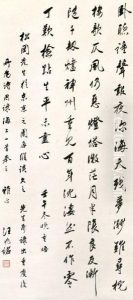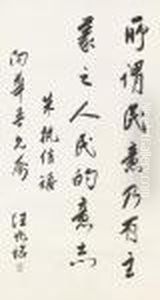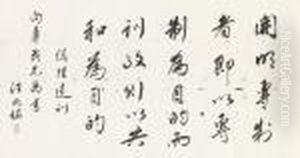Wang Jingwei Paintings
Wang Jingwei was a prominent and controversial Chinese political figure whose life spanned significant political turmoil and transformations in China. Born on May 4, 1883, in Sanshui, Guangdong Province, Wang initially gained recognition as a revolutionary committed to the overthrow of the Qing Dynasty. He was deeply influenced by the ideas of Sun Yat-sen and played an active role in the Xinhai Revolution of 1911, which led to the establishment of the Republic of China.
After the founding of the Republic, Wang Jingwei's political career was marked by his involvement in the Kuomintang (KMT), the Nationalist Party of China, where he held various key positions and was considered one of the leading figures of the party's left-wing faction. He served several times as Premier of the Republic of China and was known for his advocacy for democracy and social reforms. However, his political journey took a dramatic turn in the late 1930s.
Following the outbreak of the Second Sino-Japanese War in 1937, Wang Jingwei's stance towards Japan shifted significantly. In 1940, he broke with the Nationalist government led by Chiang Kai-shek, which was resisting the Japanese invasion, and headed a Japanese puppet regime based in Nanjing, known as the Reorganized National Government of the Republic of China. This government was established by the Japanese to gain legitimacy for their occupation of parts of China and to oppose Chiang Kai-shek's Nationalist government, which had retreated to Chongqing.
Wang's collaboration with the Japanese has made him a highly controversial figure in Chinese history. He justified his actions by claiming that cooperation with Japan was necessary for ending the war and restoring peace and stability to China. Critics, however, have denounced him as a traitor to the Chinese nation. His legacy is still debated in China and among historians, with some viewing him as a pragmatist who sought to mitigate the horrors of war and others condemning him as a collaborator who betrayed his country for personal and political gain.
Wang Jingwei died of pneumonia on November 10, 1944, in Nagoya, Japan, before the end of World War II and the ultimate defeat of Japan. His death marked the end of the puppet regime he led, and he remains a figure of contention in the narratives of China's complex history during the first half of the 20th century.



